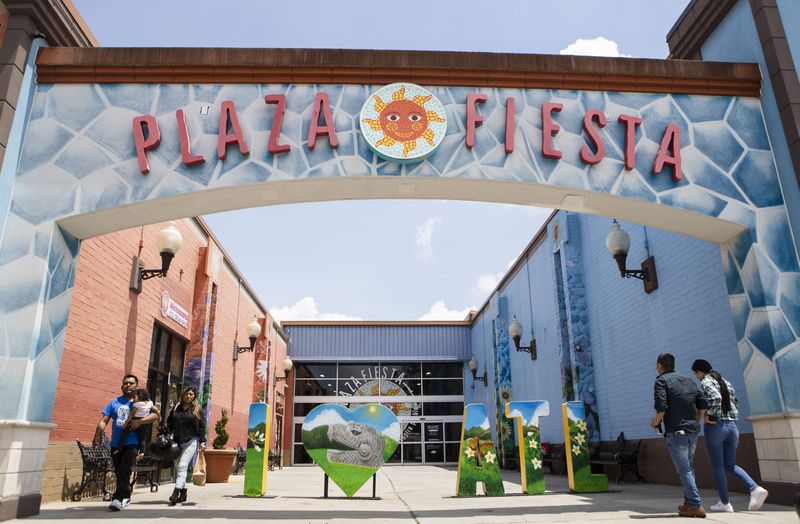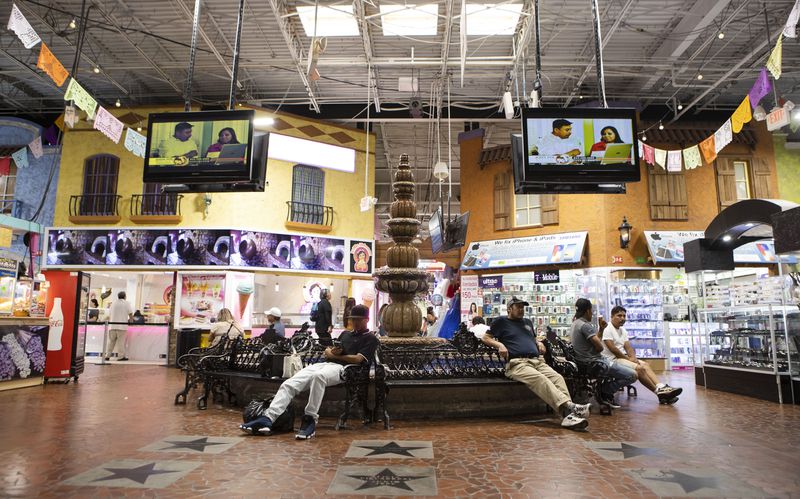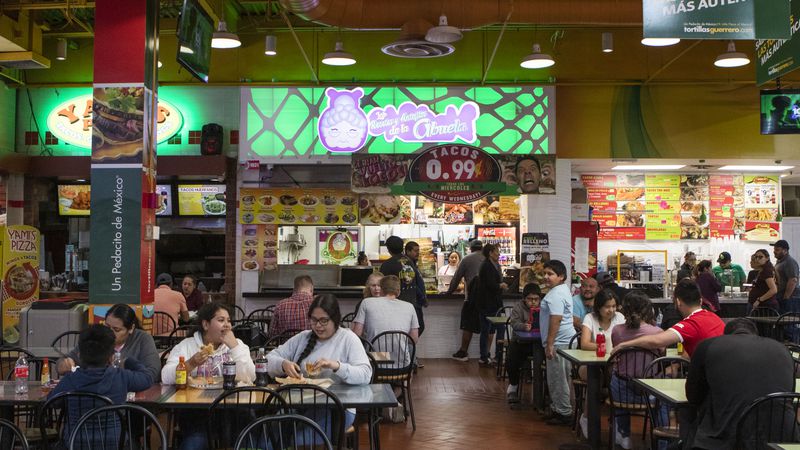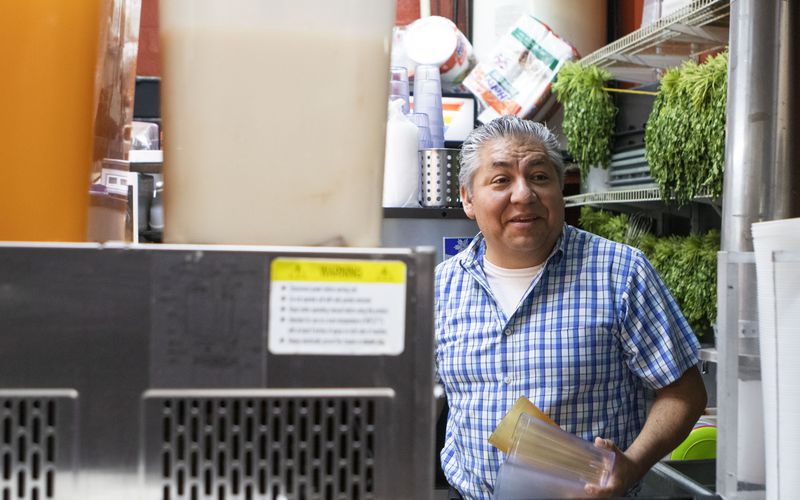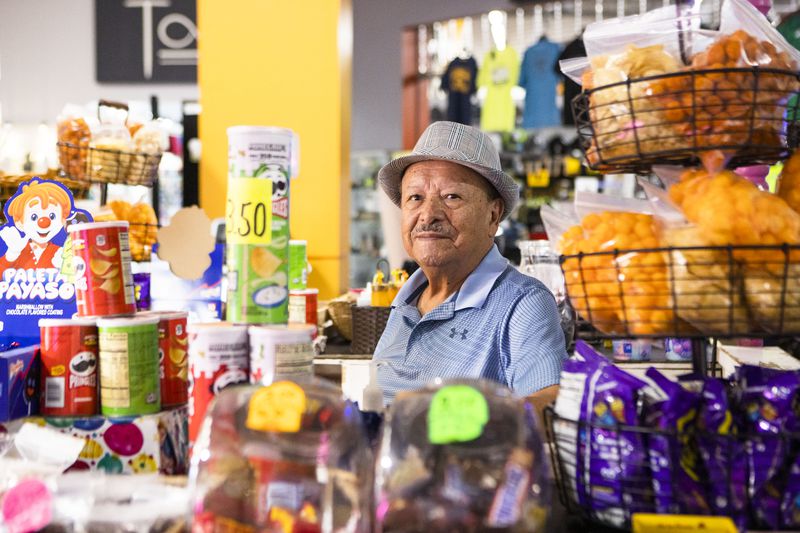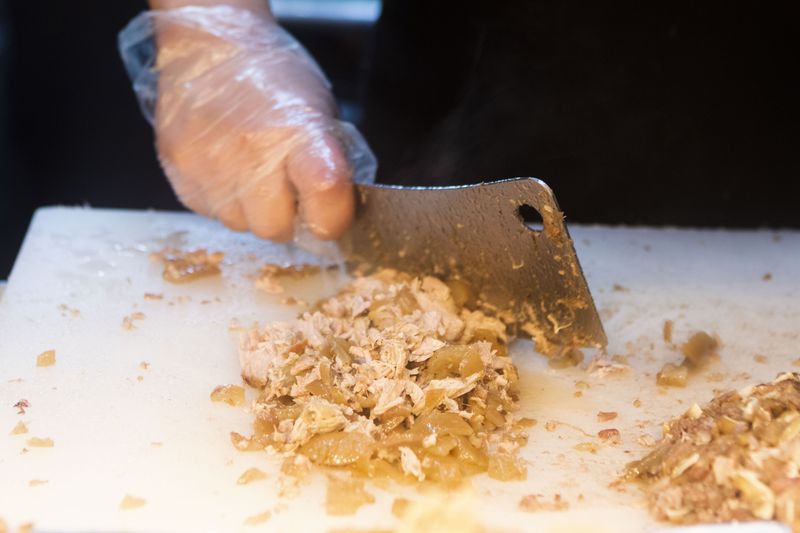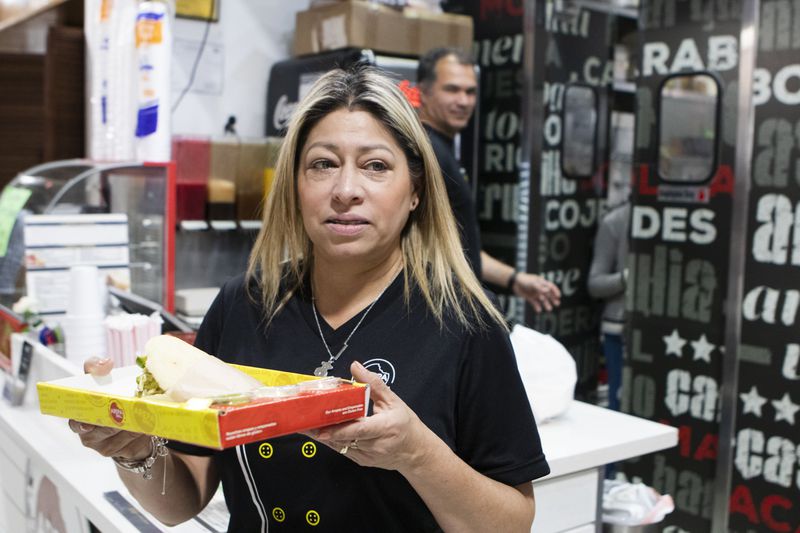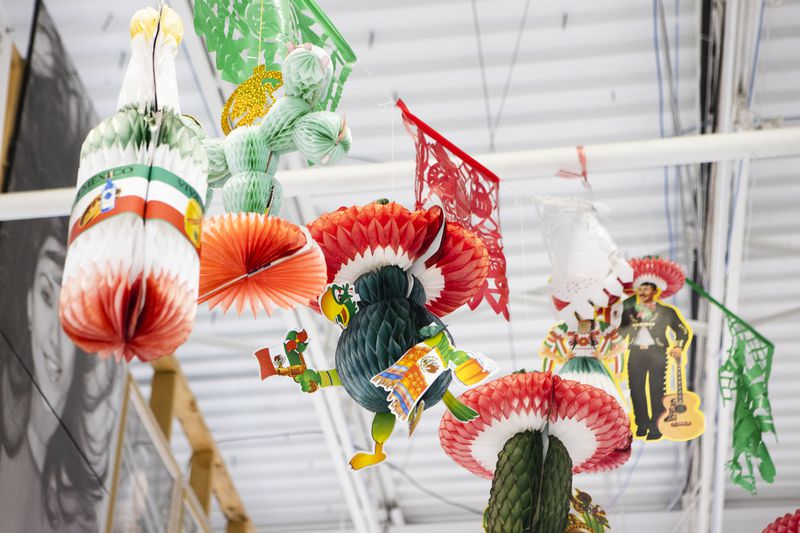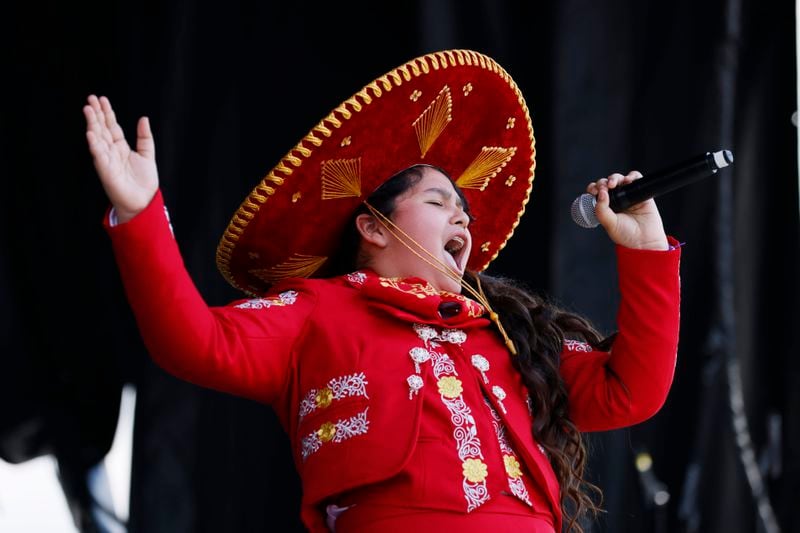For lifelong Atlanta resident Kevin Gonzalez, Buford Highway’s Plaza Fiesta is the site of some of his earliest childhood memories.
Gonzalez’s parents, immigrants from Mexico who relocated to Georgia in the 1990s, were drawn to the Hispanic mall because they could shop in their native tongue. Their family outings to Plaza Fiesta tended to occur on Sundays, after church.
Plaza Fiesta “just kind of gives the feeling of home, like a home away from home,” Gonzalez said.
Now in his 20s, Gonzalez recently took his girlfriend, who isn’t Hispanic, on her first visit. “She was like, ‘What is this place?’”
A focal point in the Latino community
With the color, bustle and décor of a Latin American street market, Plaza Fiesta has been drawing Hispanic shoppers from across the metro area — and nearby states — since it opened in 2000. It quickly became a vital part of Hispanic commercial and civic life in the region, with immigrant-serving nonprofits and community advocates relying on the space to promote social movements and offer services.
That dual legacy is reflected in the way Plaza Fiesta’s manager, Cristina Bolanos, speaks about her workplace, describing it as much a community center as a shopping mall.
Credit: Christina Matacotta
Credit: Christina Matacotta
Among the more than 250 businesses at Plaza Fiesta are widely recognized names such as Ross and Planet Fitness. But retailers also include Latino grocers, quinceañera dress shops and botánicas — shops that sell a wide range of religious and spiritual goods. There are dozens of restaurants and food stands, with many clustered in a food court that’s also adjacent to an indoor play zone.
Credit: Christina Matacotta
Credit: Christina Matacotta
When news broke last fall that Plaza Fiesta had been purchased by a North Carolina real estate investment firm, Bolanos felt compelled to make appearances on local Spanish-language media to tamp down rumors that the mall was going to close.
“We were all afraid,” said Carlos Diaz, owner of Carnitas Michoacan, a Mexican taqueria inside Plaza Fiesta.
Credit: Christina Matacotta
Credit: Christina Matacotta
As the months passed, Diaz said he and others have become reassured that there will be no fundamental change to the way the mall operates or to the communities it caters to. Asana Partners, Plaza Fiesta’s new owner, did not reply to The Atlanta Journal-Constitution’s request for comment.
According to Bolanos, who is from Ecuador, daily life in a foreign country can involve a “baseline level of stress.” Plaza Fiesta has retained an enduring appeal among immigrant populations, she said, because it’s a place where that stress goes away; it’s a shelter of sorts.
“Most of us come to the U.S. for better opportunities, but sometimes the culture shock is really big,” said Gio Garcia, Plaza Fiesta’s marketing director and an immigrant from Venezuela. “Finding a place where you feel like you can be yourself and speak your language and eat the food you’re used to … that creates a bond. I think that’s been the key to Plaza Fiesta’s success.”
That bond is fortified by large community events. Earlier this month, thousands went to Plaza Fiesta to take in hours of musical performances at a Cinco de Mayo celebration.
Credit: Christina Matacotta
Credit: Christina Matacotta
Opportunities for small business
While most may know Plaza Fiesta as a place of cultural connection, its most significant contribution to immigrant entrepreneurs is the potential for economic mobility.
Bolanos describes the mall as “a perfect business incubator,” where flexible leases and small retail spaces combine to create an apt staging ground for new ventures. Small business owners can also rely on management for help with promotion and navigating local licensing requirements.
The dominance of the Spanish-language clientele also means that new immigrants aren’t ruled out for jobs just because they can’t speak English.
“That just isn’t a requirement,” said Diaz, who started out at Plaza Fiesta with an ice cream stand in 2004 before moving on to owning and managing his current full-service restaurant.
If Plaza Fiesta in 2023 is different from the Plaza Fiesta of the early 2000s, it’s because it has evolved to reflect changing demographics inside metro Atlanta and Georgia’s Hispanic populations. Mexico still accounts for a relative majority of Latin American immigrants — laborers from that country first began arriving in considerable numbers during the construction boom that preceded the 1996 Olympics — but diasporas from Central and South America have grown considerably.
“When I invite los americanos to come [to Plaza Fiesta], I tell them that they will learn something new about all of our different countries,” Diaz said. “It’s a way of seeing a totally different side of the city of Atlanta.”
Credit: Christina Matacotta
Credit: Christina Matacotta
An indicator of the growing influence of the Venezuelan community in particular is Plaza Fiesta’s Arepa Grill, which Venezuelan immigrants Pedro Cardenas and Claudia Jimenez opened in 2019.
It’s a small space with just two tables, but it has proved popular enough for the married couple to move forward with an expansion.
“The Plaza Fiesta store was a real eye-opener,” Cardenas said.
He and Jimenez opened a much bigger Arepa Grill outpost at a Doraville strip mall in 2021, with a wider menu.
“That was one of my goals. Not just stick to arepas, but also show people here more of our culture, more of our Venezuelan dishes,” Jimenez said.
Credit: Christina Matacotta
Credit: Christina Matacotta
Part of the safety net
During the pandemic, Plaza Fiesta became an integral part of the Hispanic safety net.
As Bolanos explains, immigrant communities were hit hard by COVID because, in part, they were more likely to be employed in “essential” jobs that brought higher exposure to the virus.
“It’s not like people could say, ‘Well, I’ll just trim chickens from home.’”
Credit: Christina Matacotta
Credit: Christina Matacotta
The mall worked with various public and private partners to organize dozens of food drives and health clinics, facilitating access to tests and vaccines.
“Those first two years of the pandemic, it was so critical to get food into the hands of the community, and then try to help them get vaccinated. Those were lifesaving, critical things that needed to happen. And I think Plaza Fiesta stepped up … they did a beautiful job of opening up their doors,” said Santiago Marquez, CEO of the Latin American Association (LAA).
Credit: Miguel Martinez
Credit: Miguel Martinez
Longstanding relationships with nonprofits like the LAA, government agencies and foreign consulates had already made Plaza Fiesta a go-to place for Hispanic residents to get services and information.
“It’s a place for families to congregate … It feels like a bit of home for a lot of people. So that just makes it a natural kind of pull, and it really helps when you are trying to reach the community,” Marquez said. “And it’s a very central location also. It’s a place people are able to walk up to. There’s bus service right in front of it. So, you don’t necessarily have to have a car, which is a big deal in our community.”
Adelina Nicholls, executive director of the Georgia Latino Alliance for Human Rights, said her organization has turned to Plaza Fiesta time after time to stage events advocating for immigrant rights. She remembers a massive gathering in 2006 — when legislation viewed as anti-immigrant was gaining steam at both the federal and state levels — that she says drew more than 60,000 people.
Credit: Christina Matacotta
Credit: Christina Matacotta
Since the early 2000s, daily life for immigrants in the metro area has become less fraught with the danger of detention and deportation. In Nicholls’ view, those hard-fought gains are due in part to the ever-growing visibility of the Hispanic community, which Plaza Fiesta has helped facilitate over the years.
“I think that because of our presence in spaces like (Plaza Fiesta), the way we are perceived started to change,” she said. “Today, things are different. There’s more acceptance of our community, more understanding, less police harassment … Plaza Fiesta has been an iconic place for the representation of the Latino community.”
Credit: Miguel Martinez
Credit: Miguel Martinez
The Atlanta Journal-Constitution and Report for America are partnering to add more journalists to cover topics important to our community. Please help us fund this important work at ajc.com/give
If you go
Plaza Fiesta. 11 a.m.-8 p.m. Monday-Friday; 10:30 a.m.-8 p.m. Saturday-Sunday. 4166 Buford Highway NE, Atlanta. plazafiesta.net
Plaza Fiesta restaurants to check out
- Carnitas Michoacan, a Mexican taqueria specializing in pork fillings
- Arepa Grill, the go-to place for Venezuela’s most popular dish
- La Norteña, one of Plaza Fiesta’s longest running restaurants with classic Mexican staples
- Churros Mi Tierra, a stand that offers churros filled with everything from melted chocolate to guava sauce
- La Michoacana Niña Pop, a spot to find refreshing fruit drinks and gourmet frozen treats
About the Author
